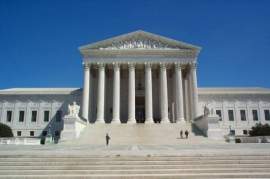
Understanding Power of Impeachment

Popular In Constitution
Purpose Of Lifetime Appointment And Pros And Cons Enumerated Powers Bicameral Legislature Background Article 3 Of The Constitution We The People 1st Amendment Who Wrote The Constitution Judicial Review Equal Protection Clause 5th Amendment 10th Amendment Three Fifths Compromise
The power of impeachment is granted to the House of Representatives under Constitutional law. In Article I, Section 2, the Constitution reads, "The House of Representatives shall chuse [sic] their Speaker and other Officers; and shall have the sole Power of Impeachment." Impeachment relates to the removal of a Government official due to crimes committed while that individual was in office.
All civil Officers of the United States that are tried and convicted for crimes such as bribery, treason, misdemeanors, and high crimes are all subject to impeachment. It is important to note that impeachment is a power that is granted to both Houses of Congress. The House of Representatives has the "sole Power" to impeach, while the Senate has the sole power to try those impeachments.
The House of Representatives is responsible to commence the impeachment proceedings. A member of the House can start the procedure by listing the charges against the official under oath or by asking for a referral to the appropriate committee of the House. In some cases, the impeachment process can begin by other officials outside of the Legislative Branch. However, the process to impeach will be carried out by the House of Representatives.
Depending on the type of impeachment, the referral will be presented to either the House Committee on the Judiciary or the House Committee on Rules. If the impeachment resolution involves a particular individual, the referral will be presented to the House Committee on the Judiciary. However, if the resolution is to authorize an investigation regarding grounds for impeachment, it must first be referred to the House Committee on Rules, which will then be sent to the House Committee on the Judiciary. When the referral to impeach is received by the Judiciary Committee, a vote must be conducted. A majority decision must be reached to determine that grounds for impeachment exist.
The Committee will then state and list those grounds in what is known as Articles of Impeachment, or an Impeachment Resolution. These are to be reported to the House of Representatives. The House of Representatives will then review and analyze the Articles of Impeachment. The House will vote on the Articles based as a whole or on each article presented therein, depending on the conclusion of the analysis.
If the decision of the House is to impeach, then there are managers that are appointed to present the situation and case to the Senate. The managers have the responsibility of presenting the Articles of Impeachment before the Senate, which will then report back to the Senate regarding its own decision. In the case that the Senate decides that it will try an impeachment case, the Chief Justice of the United States is to preside over the trial in the case of impeachment of a President.
Throughout history, there have been a number of Government officials who have been impeached, which include Presidents, members of Congress, Judges, as well as State Governors. However, in the history of the United States, only two Presidents have been impeached, Andrew Jackson and Bill Clinton. Richard Nixon would have faced impeachment had he stayed in office, but resigned his position upon the knowledge of impending impeachment.
NEXT: What Is The Three Fifths Compromise





















